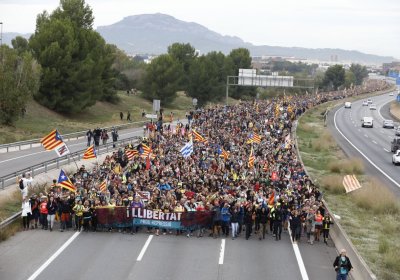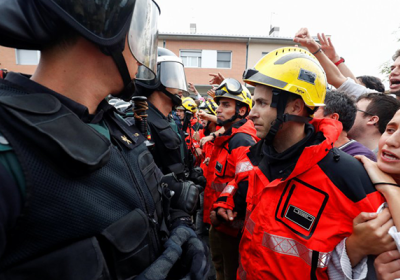On November 12, largely in reaction to the rise of the right-wing Vox, Socialist Workers' Party leader Pedro Sánchez and Unidas Podemos' Pablo Iglesias stitched up a pre-agreement for government in less than 48 hours, writes Dick Nichols.
Catalan independence movement
The final act in a week of protest in Catalonia, against the vindictive jail terms imposed on nine Catalan leaders by the Spanish Supreme Court on October 14, was a general strike and vast demonstration in the capital, Barcelona.
Infuriated by the verdict, frustrated with the strategy of the established independence movement (seen as “getting nowhere”), and most of all, outraged by police violence, young Catalans, who had never been on a barricade in their lives, decided that “direct action” was the only solution, writes Dick Nichols.
The gap between the 75%–80% of Catalans who uphold their country’s right to self-determination, and the Spanish elites and parts of Spanish society that do not want to know anything about it, was already very wide before October 14.
But on that day, when the Spanish Supreme Court condemned nine Catalan political and social movement leaders to a total of 99.5 years jail, it most likely became unbridgeable, writes Dick Nichols from Barcelona.
Occupying the Plaça d’Espanya and surrounding streets on September 11, 600,000 people came out in Barcelona to celebrate Catalan National Day (the Diada).
The vast crowd demanded the acquittal of jailed Catalan social movement and political leaders, presently awaiting a Spanish Supreme Court verdict on charges of rebellion, sedition and embezzlement.
So intense is Unidas Podemos’ desire to sit around the cabinet table with Spain's social democratic government that leader Pablo Iglesias managed to convince Together We Can, the Catalan coalition in which UP participates, to abandon its main policy — a negotiated referendum as condition for supporting a PSOE-led administration, writes Dick Nichols.
In recent weeks, senior judges in the loftiest halls of the Spanish legal system — the Supreme Court, the National High Court and the Constitutional Court — have been exposed as subverters of a fair legal process, lackeys of Spain’s almighty banking elite and bumbling incompetents, writes Dick Nichols from Barcelona.
A march of almost 200,000 people in Barcelona on October 1 marked the first anniversary of Catalonia’s independence referendum.
Pro-independence Catalans commemorated the first anniversary of the banned vote, which had to defy heavy repression as the Spanish state sought to stop it taking place. Despite a brutal crackdown by the Spanish police that left 900 people injured, most who voted backed independence.
The Catalan parliament finally voted in a new president on May 14, 199 days after the pro-independence bloc held on to its majority at the December 21 elections imposed by the Spanish government.
After the December 21 Catalan election reconfirmed a majority for pro-independence forces, it seemed inevitable a new government would soon be formed. More than two months later, however, the spectre of a repeat election haunts Catalonia.
Just after 3pm on October 27, the Catalan parliament voted to ratify the results of the country’s October 1 referendum on self-determination, proclaiming Catalonia “an independent state in the form of a republic”.
Outside parliament the vote was greeted with cheers from the tens of thousands of people who had gathered for this historic moment.
The Spanish People’s Party (PP) government of Prime Minister Mariano Rajoy has decided to implement direct rule in Catalonia.
In implementing article 155 of the Spanish constitution, which allows central government intervention in regional governments, Rajoy has the full support of the opposition Spanish Socialist Workers’ Party (PSOE) and the new-right party Citizens. The unprecedented intervention is the first since the present Spanish constitution was adopted in 1978.
A common feature of the rallies that have taken place following Catalonia’s historic October 1 vote for independence has been the outpouring of support for Catalonia’s firefighters, who played a critical role in the lead up to and during the referendum.
Catalonia’s firefighters are now calling on firefighters around the world to support their cause.
- Previous page
- Page 2
- Next page











